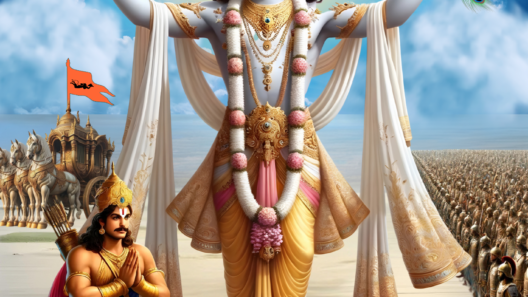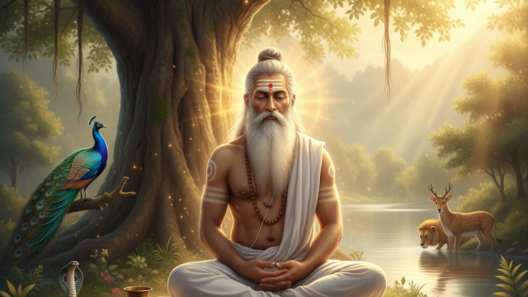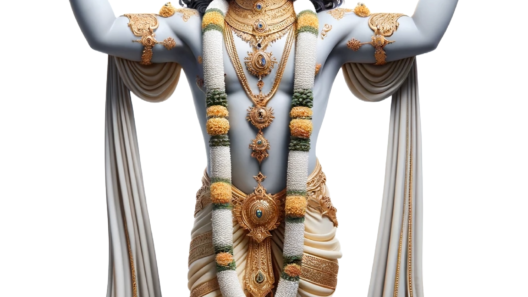Bhagavad Gita Continued:
वेदाविनाशिनं नित्यं य एनमजमव्ययम् ।
कथं स पुरुषः पार्थ कं घातयति हंति कम् ॥
Arjuna, he who is aware of this truth that the soul is eternal and indestructible , how can he kill others (meaning their souls) ?
The Soul is Eternal: The Changing Clothes Analogy
Stanza 17:
वासांसि जीर्णानि यथा विहाय नवानि गृह्णाति नरोऽपराणि।
तथा शरीराणि विहाय जीर्णान्यन्यानि संयाति नवानि देही॥
Just as human beings discard old clothes and put on new clothes, the souls will discard the old bodies and assume new bodies.
Why Weapons Cannot Cut and Fire Cannot Burn the Soul
Stanza 18:
नैनं छिंदंति शस्त्राणि नैनं दहति पावकः ॥
न चैनं क्लेदयंत्यापो न शोषयति मारुतः ॥
The soul cannot be cut by weapons, burnt by fire, soaked by water or dried by the wind.
Stanza 19:
अव्यक्तोऽयमचिंत्योऽयमविकार्योऽयमुच्यते ।
तस्मादेवं विदित्वैनं नानुशोचितुमर्हसि ॥
The soul is unmanifest, uncomprehendable and immutable (non changing). Therefore, once you know the nature of the soul, it is not proper to feel sad or grieve (worry) over the death.
Understanding the Inevitability of Birth and Death
Stanza 20:
जातस्य हि ध्रुवो मृत्युर्ध्रुवं जन्म मृतस्य च ।
तस्मादपरिहार्येऽर्थे न त्वं शोचितुमर्हसि ॥
Death is certain to all those who are born, and rebirth is inevitable to all those who are dead. When this is an inevitable phenomena, it better not to grieve on this.
Stanza 21:
अव्यक्तादीनि भूतानि व्यक्तमध्यानि भारत ।
अव्यक्तनिधनान्येव तत्र का परिदेवना ॥
All the living beings (souls) were not visible before birth and again they become invisible after death. They are in the physical bodies only in-between birth and death.
Stanza 22:
देही नित्यमवध्योऽयं देहे सर्वस्य भारत ।
तस्मात्सर्वाणि भूतानि न त्वं शोचितुमर्हसी ॥
The soul is present in all the living bodies. Therefore, is it possible to grieve for the death of all those living beings ?
Stanza 23:
स्वधर्ममपि चावेक्ष्य न विकंपितुमर्हसि ।
धर्म्याद्धियुद्धाच्छ्रेयोऽन्यत्क्षत्रियस्य न विद्यते ॥
Even by the count of your natural duty as a warrior, fighting a just war (war to uphold righteousness ) is the only graceful thing for you (because you are doing your duty).
Stanza 24:
अथ चेत्त्वमिमं धर्म्यं संग्रामं न करिष्यसि ।
ततः स्वधर्मं कीर्तिं च हित्वापापमवाप्स्यसि ॥
If you do not fight this just war (to establish righteousness), then you will be not only failing in your bounden duty but also incur wrong doing (act of omission).
Stanza 25:
हतो वा प्राप्स्यसि स्वर्गं चित्वा वा भोक्ष्यसे महीम् ।
तस्मादुत्तिष्ठ कौन्तेय युद्धाय कृतनिश्चयः ॥
If you get killed in this just war, you will reach divine planes of existence . If you are victorious, you will rule this empire . Therefore, be firm in your resolve to fight this war.
Stanza 26:
सुखदुःखे समे कृत्वा लाभालाभौ जयजयौ ।
ततो युद्धाय यज्यस्व नैवं पापमवाप्स्यसि ॥
Stanza 27:
एषा तेऽभिहिता सांख्ये बुद्धिर्योगे त्विमां शृणु ।
बुद्ध्या युक्तो यया पार्थ कर्मबंधं प्रहास्यसि ॥
Arjuna, so for I have counselled you intellectually. Now listen to me with regard to doing ACTION without attachment or desire towards it (Karma Yoga). By performing this type of action you will be freed from the bondage of action and reaction (Karma).
Key Lesson: 4 Truths of Your Inner Self
"The soul is never born, nor does it ever die."
Indestructible: It cannot be cut by weapons, burnt by fire, or dried by the wind. It is beyond the physical elements.
Changing Garments: Just as you discard old clothes for new ones, the soul discards an old body for a new birth. Death is just a transition.
Unchanging (Immutable): While the body grows old and changes, the “Dehi” (the dweller within) remains exactly the same.
Invisible Origin: We are invisible before birth and invisible after death. We only wear a physical “costume” for a brief time in between.
The Takeaway: Knowing this truth removes the fear of death and the pain of grief. You are not the body; you are the eternal light within it.












